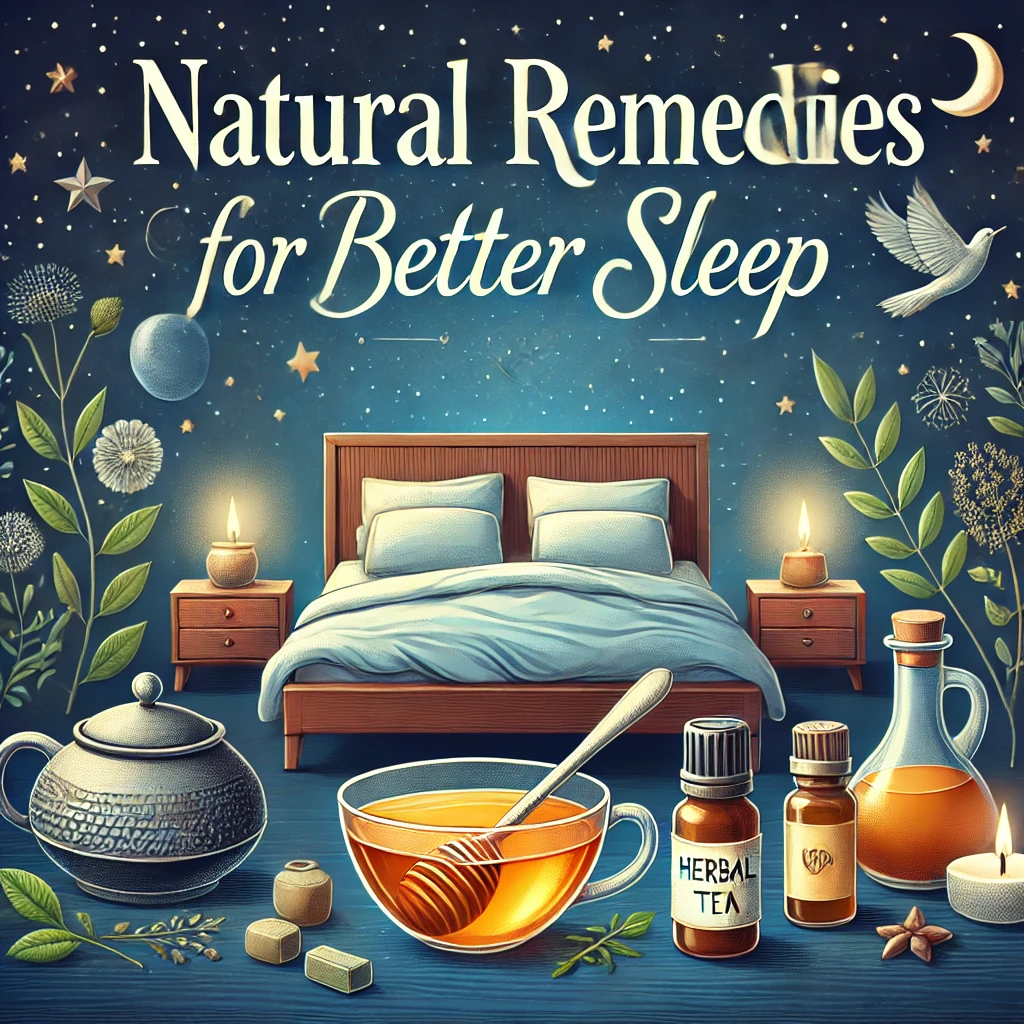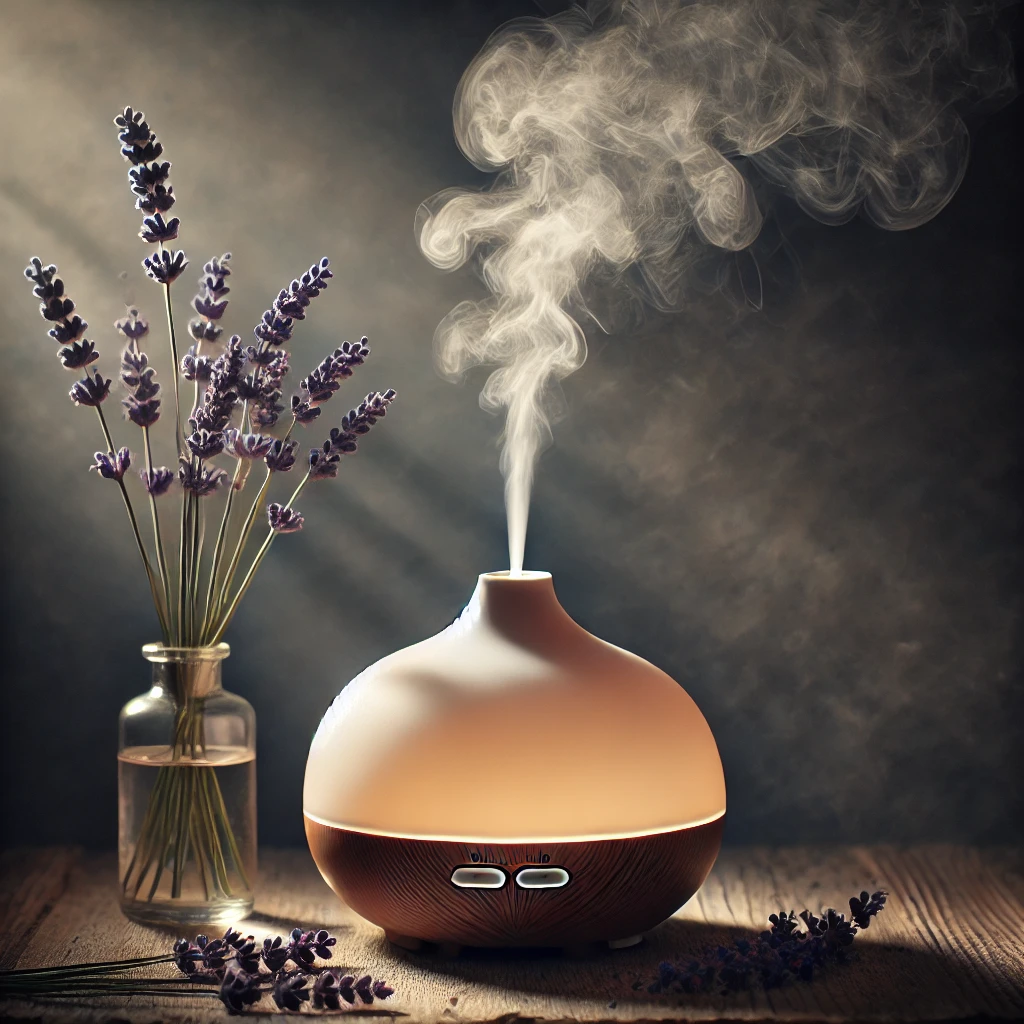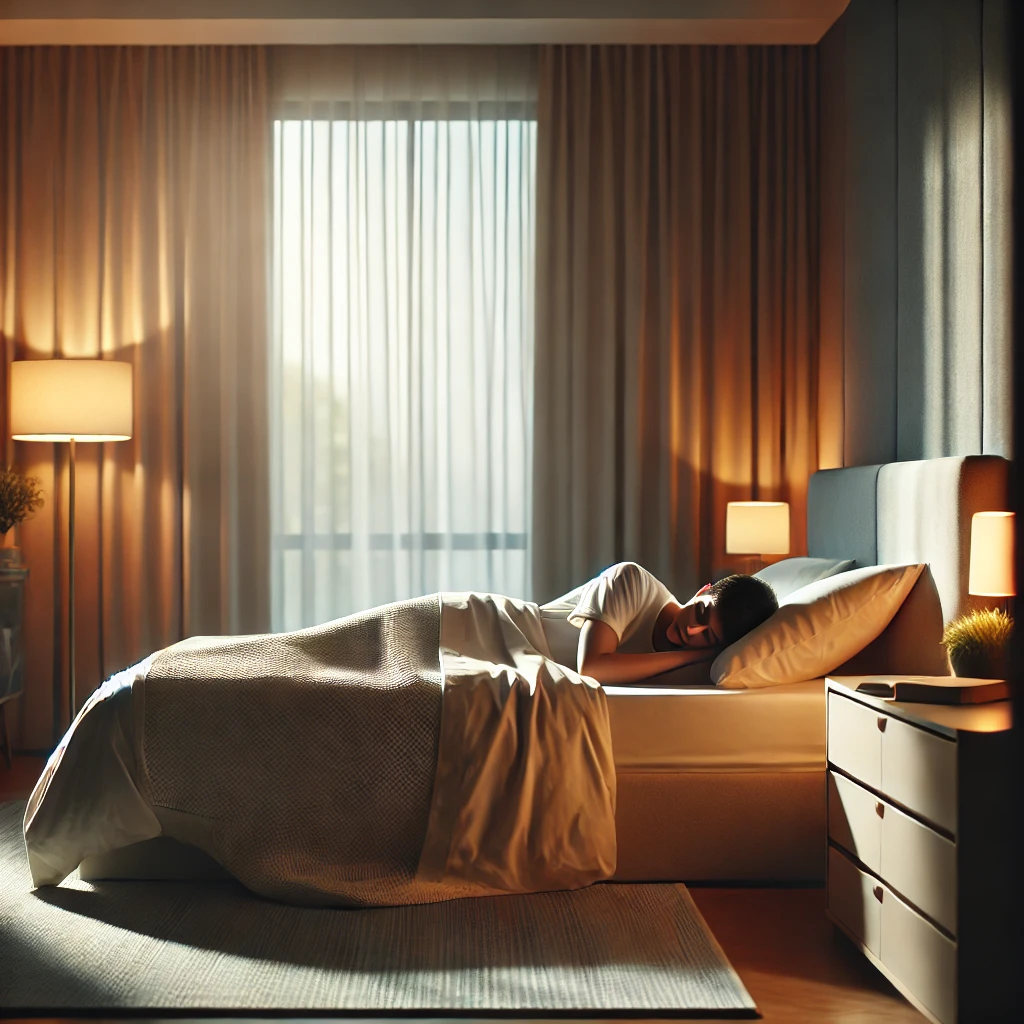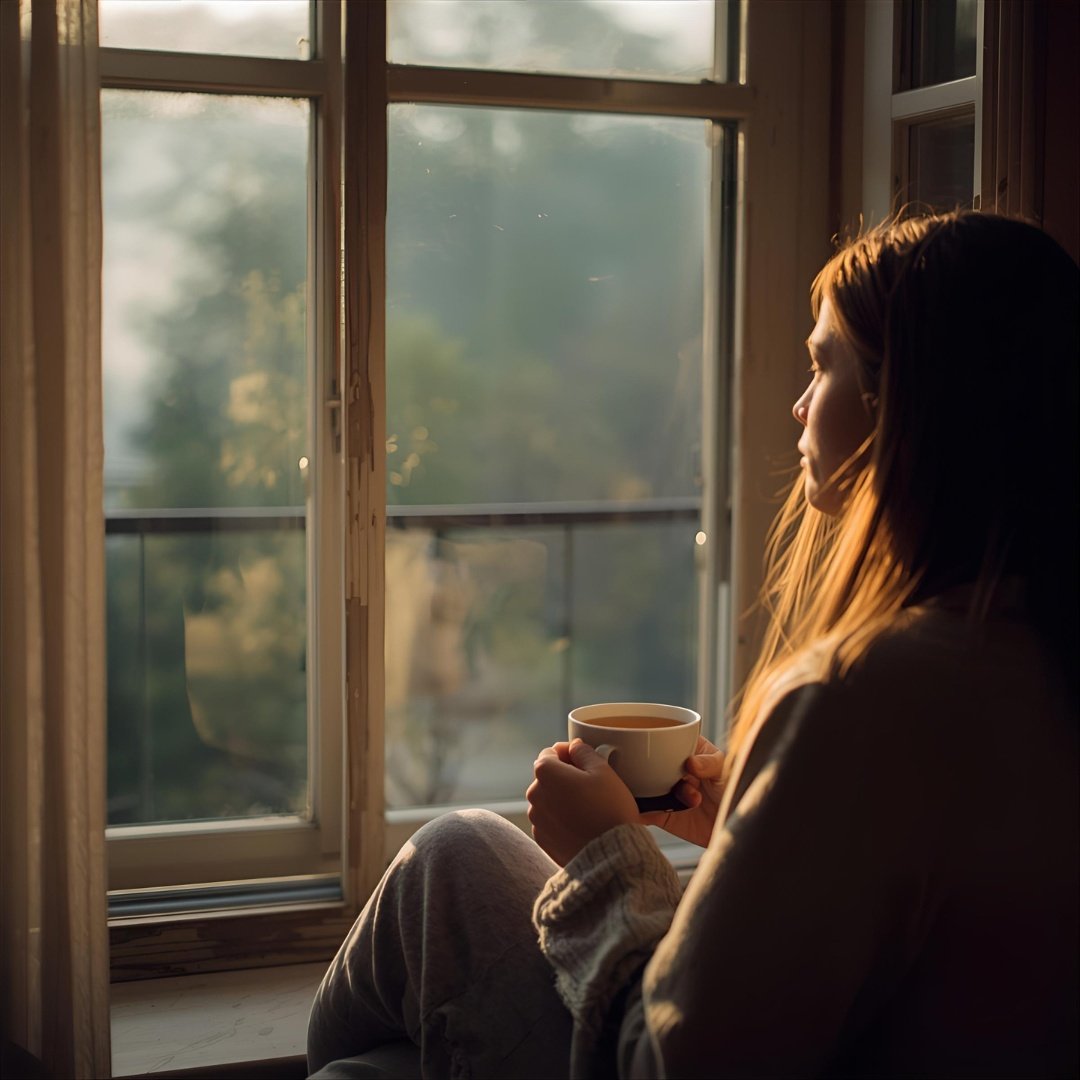Disclosure:
Thank you for reading this post, don't forget to subscribe!
Some of the links on this website are affiliate links. This means that if you click on the link and make a purchase, we may receive a small commission at no extra cost to you. Your support helps us keep the site running.Learn more on my Privacy Policy and Affiliate Disclosure page. Thank you for your support!

Sleep is a fundamental aspect of our well-being. It’s during sleep that our bodies repair themselves, our minds consolidate memories, and we recharge for the challenges of the next day. Yet, many of us struggle with getting a good night’s rest. In our fast-paced world, stress, poor diet, and lifestyle choices often lead to sleep issues. But fear not, natural remedies for better sleep can provide the solution you need to rest peacefully. This article explores various methods to enhance your sleep quality naturally, from diet and exercise to mindfulness and herbal remedies.
Natural Remedies For Better Sleep
Definition and Benefits
Natural remedies for better sleep encompass a variety of practices and treatments derived from nature to improve sleep quality without relying on pharmaceuticals. These remedies can be highly effective, often with fewer side effects than conventional sleep medications. They include lifestyle changes, dietary adjustments, herbal treatments, and various relaxation techniques. The benefits are multifaceted: improved sleep quality, reduced stress levels, and enhanced overall health.
Understanding Sleep Cycles
To truly appreciate how natural remedies can help, it’s essential to understand sleep cycles. Sleep is divided into several stages, including REM (rapid eye movement) and non-REM sleep. REM sleep is when we dream, and it’s crucial for cognitive functions like memory and learning. Non-REM sleep consists of three stages, progressing from light sleep to deep sleep, which is the most restorative. Disruptions in these cycles can lead to sleep disorders and poor sleep quality.
Role of Diet
Foods That Promote Sleep
What you eat can significantly impact your sleep. Foods rich in tryptophan, magnesium, and melatonin can promote better sleep. Tryptophan is an amino acid found in turkey, chicken, and dairy products, which the body converts into serotonin and melatonin. Magnesium, found in leafy greens, nuts, and seeds, helps relax muscles and nerves. Melatonin-rich foods like cherries and tomatoes can help regulate your sleep-wake cycle.
read next: Sleep Hygiene 101-Tips for Getting a Good Night’s Rest.
Foods to Avoid
Conversely, certain foods and drinks can hinder your sleep. Caffeine, found in coffee, tea, and chocolate, is a well-known stimulant that can keep you awake. Alcohol might make you drowsy initially but can disrupt your sleep cycle later in the night. Heavy, spicy, or fatty foods can cause indigestion, making it hard to fall asleep.
Herbal Teas
Chamomile

Chamomile tea is renowned for its calming properties. It contains apigenin, an antioxidant that binds to receptors in your brain to promote sleepiness and reduce insomnia. Drinking a warm cup of chamomile tea before bed can be a soothing nightly ritual.
Lavender
Lavender isn’t just a pleasant fragrance; it’s also a powerful sleep aid. Lavender tea or essential oil can help improve sleep quality. The soothing scent of lavender has been shown to decrease heart rate and blood pressure, putting you in a relaxed state conducive to sleep.
Peppermint
Peppermint tea can also aid in sleep by relaxing the muscles and calming the digestive system. It’s especially useful if indigestion or an upset stomach is keeping you awake.
Aromatherapy
Essential Oils

Aromatherapy uses essential oils to promote relaxation and sleep. Lavender, chamomile, and sandalwood oils are particularly effective. You can use these oils in a diffuser, add a few drops to your bath, or apply them to your pillow for a restful night’s sleep.
Diffusers
Using a diffuser to spread the scent of essential oils in your bedroom can create a calming atmosphere. The gentle, continuous release of essential oils can help you unwind and prepare for sleep.
find out more about: Top 10 Must-Read Books and Resources for a Healthy Lifestyle: Insights from Leading Experts
Physical Activity
Exercise Routine
Regular physical activity is a cornerstone of good sleep. Exercise helps regulate your body’s internal clock, promotes deeper sleep stages, and reduces insomnia. However, timing is crucial. While morning or afternoon exercise can boost sleep quality, vigorous workouts right before bed might be stimulating.
Yoga and Meditation

Yoga and meditation are excellent ways to wind down before bed. Yoga, with its focus on stretching and relaxation, can ease tension in the body. Meditation, on the other hand, helps calm the mind. Techniques like mindfulness meditation or guided imagery can prepare you for a restful night.
learn more about: 12 Tips for Maintaining a Healthy Lifestyle-healthline.
Stress Management
Relaxation Techniques
Stress is a significant barrier to good sleep. Incorporating relaxation techniques such as deep breathing, progressive muscle relaxation, or visualization can help reduce stress levels and promote better sleep. These practices calm your mind and body, making it easier to drift off.
Cognitive Behavioral Therapy
Cognitive Behavioral Therapy (CBT) for insomnia (CBT-I) is a structured program that helps you identify and replace thoughts and behaviors that cause or worsen sleep problems. It includes techniques for controlling or eliminating negative thoughts and worries that keep you awake.
Bedtime Routine
Establishing a consistent bedtime routine can signal to your body that it’s time to wind down. This could include activities like reading, taking a warm bath, or practicing relaxation exercises. Consistency is key; try to go to bed and wake up at the same time every day.
Sleep Environment
Your sleep environment plays a crucial role in your ability to fall and stay asleep. Ensure your bedroom is cool, dark, and quiet. Investing in a comfortable mattress and pillows can also make a significant difference. Consider using blackout curtains and earplugs if necessary.
Acupuncture
How It Works
Acupuncture, a traditional Chinese medicine practice, involves inserting thin needles into specific points on the body to balance energy flow. It’s believed to help with sleep by reducing anxiety, stimulating melatonin production, and promoting relaxation.
Benefits
Studies have shown that acupuncture can improve sleep quality and duration, particularly for those suffering from insomnia. It’s a safe, natural treatment that can complement other sleep-enhancing practices.
check out: Top 10 Must-Read Books and Resources for a Healthy Lifestyle-Insights from Leading Experts
Supplements
Melatonin
Melatonin is a hormone that regulates the sleep-wake cycle. Taking melatonin supplements can help adjust your body clock, particularly if you have jet lag or shift work disorder. It’s best taken an hour before bed.
Magnesium
Magnesium supplements can also promote sleep. Magnesium plays a role in muscle relaxation and nerve function, helping you fall asleep and stay asleep.
Valerian Root
Valerian root is a herbal supplement known for its sedative properties. It can reduce the time it takes to fall asleep and improve sleep quality.
Mindfulness and Meditation
Techniques
Mindfulness meditation involves focusing on your breathing and bringing your attention to the present moment without judgment. Techniques such as body scan meditation or loving-kindness meditation can help relax your mind and prepare it for sleep.
Apps and Tools
Several apps and tools are available to guide you through meditation practices. Apps like Headspace, Calm, and Insight Timer offer guided meditations specifically designed to improve sleep.
Cognitive Behavioral Therapy
How It Helps
Cognitive Behavioral Therapy for Insomnia (CBT-I) helps identify and change thoughts and behaviors that negatively affect sleep. Techniques include sleep restriction, stimulus control, and cognitive restructuring.
Techniques
Sleep restriction involves limiting the time spent in bed to the actual amount of sleep you’re getting, gradually increasing it as sleep improves. Stimulus control involves creating a strong association between your bed and sleep, avoiding activities like watching TV or eating in bed.
Breathing Techniques
Deep Breathing
Deep breathing exercises can help calm your mind and body. Try inhaling slowly through your nose, holding your breath for a few seconds, and exhaling slowly through your mouth. This technique can reduce stress and promote relaxation.
Pranayama
Pranayama, a yogic breathing technique, involves controlling your breath to enhance the flow of energy in your body. Techniques like Nadi Shodhana (alternate nostril breathing) can help balance your nervous system and prepare you for sleep.
Light Exposure
Sunlight
Exposure to natural sunlight during the day helps regulate your sleep-wake cycle. Try to spend at least 30 minutes outside each day, especially in the morning.
Light Therapy
Light therapy involves using a lightbox that mimics natural sunlight to help regulate your circadian rhythms. It’s particularly useful for those with seasonal affective disorder (SAD) or other circadian rhythm disorders.
Digital Detox
Reducing Screen Time
The blue light emitted by phones, tablets, and computers can interfere with your body’s production of melatonin. Reducing screen time before bed and using blue light filters can help mitigate this effect.
Blue Light Filters
Many devices now offer blue light filters, which reduce the amount of blue light emitted. Using these filters, especially in the evening, can help maintain your natural sleep cycle.
Sound Therapy
White Noise
White noise machines produce a consistent sound that can mask disruptive noises, helping you fall and stay asleep. They’re particularly useful for those living in noisy environments.
Nature Sounds
Listening to nature sounds like rain, waves, or forest ambience can also promote relaxation and sleep. These sounds can be soothing and help create a tranquil sleep environment.
Sleep-Friendly Environment

Bedroom Setup
Creating a sleep-friendly environment involves optimizing your bedroom for sleep. This includes a comfortable mattress and pillows, blackout curtains, and a cool room temperature.
Optimal Conditions
Keep your bedroom cool, dark, and quiet. Use blackout curtains to block out light, earplugs or white noise machines to mask noise, and maintain a consistent temperature for a comfortable sleep.
Bedtime Rituals
Reading
Reading a book can be a great way to unwind before bed. Choose something light and relaxing to help take your mind off the day’s stresses.
Journaling
Writing in a journal before bed can help clear your mind of worries and thoughts that might keep you awake. Reflecting on your day and jotting down any lingering thoughts can be therapeutic.
The Role of Napping
Benefits
Napping can provide a quick energy boost and improve mood and performance. However, it’s important to nap strategically to avoid disrupting your nighttime sleep.
How to Nap Effectively
Keep naps short, around 20-30 minutes, and try to nap in the early afternoon. This timing helps prevent grogginess and won’t interfere with your nighttime sleep.
Professional Help
When to Seek Help
If natural remedies and lifestyle changes aren’t improving your sleep, it may be time to seek professional help. Persistent sleep issues can indicate underlying health conditions that need medical attention.
Types of Specialists
Sleep specialists, neurologists, and psychologists can help diagnose and treat sleep disorders. They may conduct sleep studies or recommend treatments like CBT-I or medication.
Understanding Sleep Disorders
Insomnia
Insomnia is the most common sleep disorder, characterized by difficulty falling or staying asleep. It can be caused by stress, anxiety, poor sleep habits, or medical conditions.
Sleep Apnea
Sleep apnea is a serious condition where breathing repeatedly stops and starts during sleep. It requires medical intervention and can be managed with lifestyle changes, CPAP machines, or surgery.
Explore More:
Tracking Sleep
Sleep Trackers

Sleep trackers can help you understand your sleep patterns and identify areas for improvement. Devices like Fitbit, Apple Watch, and Oura Ring track metrics like sleep duration, stages, and quality.
Apps
Sleep tracking apps can also provide insights into your sleep habits. Apps like Sleep Cycle, Pillow, and SleepScore analyze your sleep data and offer personalized tips for better sleep.
Alternative Therapies
Reiki
Reiki is an energy healing practice that involves transferring energy through the hands to promote relaxation and healing. It can help reduce stress and improve sleep quality.
Hypnotherapy
Hypnotherapy uses guided relaxation and focused attention to help change negative thoughts and behaviors related to sleep. It’s a complementary therapy that can support other sleep-enhancing practices.
Personal Stories
Success Stories
Hearing from others who have successfully improved their sleep using natural remedies can be inspiring. Personal stories provide real-life examples and tips that you can try yourself.
Expert Opinions
Experts in sleep medicine and holistic health can offer valuable insights and recommendations. Their expertise can help you navigate the various natural remedies and find what works best for you.
Natural Remedies For Better Sleep

It’s clear that natural remedies for better sleep can offer a range of benefits. Whether you struggle with occasional sleeplessness or chronic insomnia, incorporating these remedies into your routine can make a significant difference. From adjusting your diet to practicing mindfulness, these strategies can help you achieve the restful, restorative sleep you deserve.
previous post:
- Wealthy Affiliate Review: Can You REALLY Make Money In 2024?
- Beginner’s Guide To Weight Loss: Tips And Tricks
- Building A Morning Routine For A Productive Day
- Creating A Healthy Work-Life Balance
- HIIT Workouts For Maximum Fat Burn:Best Hiit Workouts For Fat Burning
FAQs
How can I improve my sleep naturally?
Improving sleep naturally involves several strategies, such as maintaining a consistent sleep schedule, creating a comfortable sleep environment, reducing caffeine and alcohol intake, and incorporating relaxation techniques like yoga and meditation.
What are some effective herbal teas for sleep?
Chamomile, lavender, and peppermint teas are popular choices for promoting sleep. They have calming properties that can help you relax and prepare for bed.
Can exercise help with sleep?
Yes, regular exercise can improve sleep quality by reducing stress and anxiety and promoting deeper sleep stages. However, it’s best to avoid vigorous exercise right before bed.
How does light exposure affect sleep?
Natural light helps regulate your circadian rhythms, so getting exposure to sunlight during the day can improve sleep. Conversely, exposure to blue light from screens at night can interfere with melatonin production.
What is cognitive behavioral therapy for insomnia (CBT-I)?
CBT-I is a structured program that helps identify and change thoughts and behaviors that negatively impact sleep. It includes techniques like sleep restriction and stimulus control to improve sleep quality.
When should I seek professional help for sleep issues?
If you’ve tried natural remedies and lifestyle changes without success, it’s time to seek professional help. Persistent sleep issues may indicate underlying health conditions that require medical attention.
Conclusion
Improving your sleep naturally is entirely possible with the right strategies and a bit of patience. By understanding your sleep needs and making informed choices about your diet, exercise, and relaxation practices, you can enjoy better sleep and enhanced overall well-being. Remember, consistency is key, and it’s important to give these natural remedies time to work. Sweet dream
HEALTH / WELLNESS / FITNESS / NUTRITION
Share this article











